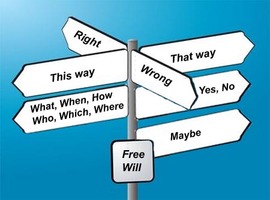On Schopenhauers Freedom of the Will
Expound and assess Schopenhauer’s argument that free will is an illusion. Does he succeed in showing what he calls “relative” freedom is not really enough to constitute free will?
Schopenhauer does succeed in logically arguing that what he calls “will” is not “free”, as he conceives the terms “will” and “free”. However, he does not succeed in showing that what we commonly understand to be freedom, is in any way undermined by his conception of the will. At best, he shows is that our common conception is incomplete. I will show that Schopenhauer sets up a false dichotomy between causality and the will via a misapplication of the notion of “negative” freedom, and that he asserts a scientifically inaccurate view of human consciousness that conflates causality with fatalism through his use of the concept of the “character” of the will. Finally, I will forgive Schopenhauer his mistakes, and show how his conception of the will, as crude as it was, pointed (perhaps inadvertently) to a more sophisticated approach to understanding human freedom.
